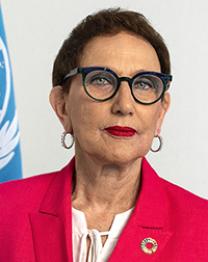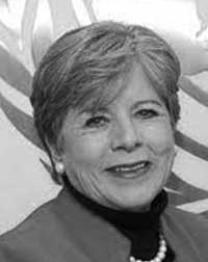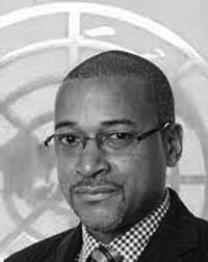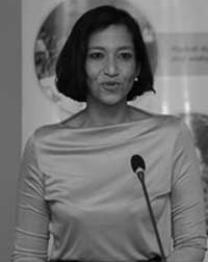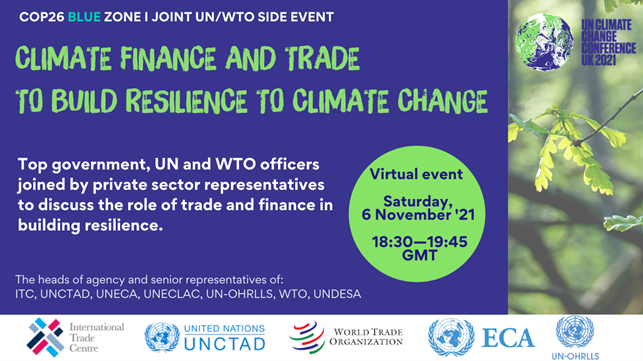
Climate change is the key transformational and cross-cutting challenge of our times. By disrupting key economic activities, threatening food security and local livelihoods, it amplifies developmental challenges, in particular in the least developed countries (LDCs), landlocked developing countries (LLDCs) and small island developing states (SIDS). According to the World Bank, impacts are most felt at the bottom of the pyramid as climate change is expected to push 132 million people into extreme poverty by 2030. Urgent and collective action and concerted cooperation among a multiplicity of actors is not an option but a must in order to contribute to a global green transition that leaves no one behind. All actors are called to establish inclusive partnerships, identify ground-breaking solutions and mobilize climate finance to build a more equitable, resilient and greener multilateral setting.
While frequently overlooked in multilateral processes, international trade can be an integral part in building resilience and achieving the SDGs. By generating the resources needed for investment, trade can simultaneously create wealth and build resilience of the most vulnerable nations while promoting a systemic shift towards sustainable production and consumption.
In addition, mobilizing climate finance and investment capital through innovative finance mechanisms, such as climate action-debt swaps and green bonds, is also needed to ensure that solutions are translated into practice and enhance the adaptive capacity and resilience of the most vulnerable.
This session will place emphasis on LDCs, LLDCs and SIDS, which, despite their limited contribution to climate change, are on the front-line of climate hazards and on the forefront of climate ambition. In particular, the session is expected to:
- Increase awareness of the challenges from climate change faced by vulnerable countries and their small businesses doing trade;
- Showcase best practices in strengthening adaptative capacity, improving resource efficiency and tapping into new consumption trends;
- Highlight innovative finance mechanisms available to unlock investment in adaptation and mitigation action and to ensure effective access commensurate with the urgency and scale of climate hazards.
In September 2021, Rebeca Grynspan was appointed Secretary-General of the United Nations Conference on Trade and Development (UNCTAD), becoming the first woman to lead the organization in its 60-year history.
Rebeca Grynspan, an economist and former Vice President of Costa Rica, is an experienced leader of international institutions with a substantive track record in government, UN diplomacy, economic policy and multilateral cooperation at the global level.
Prior to joining the United Nations, she was Vice President of Costa Rica and held cabinet positions as Minister of Housing, Minister Coordinator of Economic and Social Affairs and Deputy Finance Minister.
Previously, she served as Secretary-General of the Ibero-American Conference (2014–2021), chairing regional summits of Heads of State and Government; United Nations Under-Secretary-General and Associate Administrator of the United Nations Development Programme (UNDP); and UNDP Regional Director for Latin America and the Caribbean. She was a member of the UN Commission for the Reconstruction of Haiti, representing the UN Secretary-General.
At UNCTAD, Grynspan has been at the centre of critical negotiations to address global trade and development challenges. She played a decisive role in the successful Black Sea Grain Initiative brokered between the UN, Türkiye, the Russian Federation and Ukraine, which enabled the safe export of over 32 million tons of grain, lowered global food prices by 22% and prevented millions from falling into food insecurity. She also leads the UN Global Crisis Response Group on food, energy and finance, and has represented the UN in G20 summits.
Her leadership has been recognized widely. In 2024, she received the Doha Negotiator of the Year Award for spearheading UN efforts to restore Black Sea trade routes. In 2025, Spain’s Ministry of Foreign Affairs, European Union and Cooperation awarded her the inaugural Isabel Oyarzábal Women in Multilateralism International Prize for her contribution to multilateralism.
Ms. Grynspan holds degrees in economics from the University of Costa Rica and the University of Sussex, and honorary doctorates from several European universities.
Pamela Coke-Hamilton has served as Executive Director of the International Trade Centre since 1 October 2020. She joined ITC from the United Nations Conference on Trade and Development (UNCTAD), where she was Director of the Division on International Trade and Commodities.
Ms. Coke-Hamilton has a breadth of experience and expertise in trade-related capacity-building and sustainable development. She served with the Jamaican Government, the Caribbean Forum in trade negotiations, and multilateral institutions, including the Organization of American States and InterAmerican Development Bank. She previously served as Executive Director of the Caribbean Export Development Agency, strengthening the private sector and micro, small and medium enterprises through investment promotion.
She has a deep understanding of the challenges faced by vulnerable economies such as the small island developing States and least developed countries. Ms. Coke-Hamilton has worked extensively with the private sector across African, Caribbean and Pacific countries and academia to build trade-related institutional strength within member States. She also established the Women Empowered through Export (WeXport) platform to address the disadvantages that women-owned firms experience in accessing markets.
Ms. Coke-Hamilton holds a Juris Doctor in Law from the Georgetown University School of Law in Washington, DC, and a BSc in International Relations and Economics from the University of the West Indies, Kingston, Jamaica.
Ambassador Jean-Marie Paugam (France) has held senior management positions in the French Government on trade, most recently as Permanent Representative of France to the WTO.
He has also held a number of senior positions in the French Ministry of Economy and Finance, including as a member of the Executive Committee of the French Treasury. He has also served as Deputy Executive Director of the International Trade Centre in Geneva.
He has accumulated a deep and practical knowledge of government practices on trade as well as being familiar with high-level dialogues on trade and international economic operations. He has published a number of articles on trade-related issues, in particular when serving as Senior Research Fellow on International Trade at the French Institute for International Relations (IFPRI).
Ambassador Paugam graduated from ENA in Paris and obtained degrees in Political Science from the Institute of Political Science in Aix-en-Provence and in Law from the Faculty of Law Aix-Marseille III.
Ms. Bárcena Ibarra served as the Chef de Cabinet to the former Secretary-General before serving as the Under-Secretary-General for Management.
Earlier in her career, Ms. Bárcena Ibarra served as Deputy Executive Secretary of ECLAC, and in this capacity she contributed substantively and increased interagency collaboration to provide a regional perspective on the Millennium Development Goals and on Financing for Sustainable Development.
As Chief of the Environment and Human Settlements Division of ECLAC, she heightened the profile of the Regional Commission in the areas of climate change, sustainable energy, fiscal policies and environment. She previously served as Coordinator of the United Nations Environment Programme (UNEP), as well as Adviser to the Latin American and Caribbean Sustainable Development Programme in the United Nations Development Programme (UNDP).
She was part of the Secretariat that was in charge of preparing the United Nations Conference on Environment and Development (UNCED), held in Rio de Janeiro, Brazil, in 1992.
Previously, she served in the Government of Mexico as the first Vice-Minister of Ecology and as Director-General of the National Institute of Fisheries.
She holds a Bachelor of Science in biology from the Universidad Nacional Autónoma de México and a master’s degree in public administration from Harvard University.
Courtenay Rattray began his tenure as High Representative for the Least Developed Countries, Landlocked Developing Countries and Small Island Developing States in July, 2021.
Mr. Rattray joined OHRLLS from his role as Jamaica’s Ambassador and Permanent Representative to the United Nations in New York. He also served as Co-chair of the Group of Friends of the Sustainable Development Goals (SDGs) Financing; Children and the SDGs; as well as the Group of Friends of Decent Work.
Prior to his work at the United Nations, Mr. Rattray served as Jamaica’s Ambassador to China (2008-2013); Director of the Bilateral Relations Department in the Ministry of Foreign Affairs and Foreign Trade in Kingston (2005 -2008); Deputy Chief of Mission, Embassy of Jamaica in Washington, D.C., (2001-2005); Special Adviser to the Minister for Foreign Affairs and Foreign Trade (2000-2001); and Special Adviser to the Minister for Industry and Investment (1999-2000).
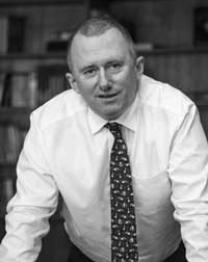
Prior to becoming Minister, he served as the Director of the Gabonese National Parks Agency for 10 years having previously spent almost 20 years with the Wildlife Conservation Society.
Since 2002 he has been an advisor to the President’s Office in Gabon, in matters concerning National Parks and Ecotourism development. He left WCS in 2008 to focus more on these responsibilities and on the UNFCCC negotiations, as part of Gabon’s Negotiating Team.
Professor White is an Honorary Professor at the University of Stirling. He has always tried to incorporate science into conservation and sustainable development work and published about 70 papers and book chapters, 7 books and is the editor of a book series on Gabon’s National Parks. His research interests include forest history through the Pleistocene and Holocene, forestry and forest ecology.
In 2010, he was awarded a CBE for his services to conservation in Central Africa. His career in the West and Central African forest belt spans 35 years.
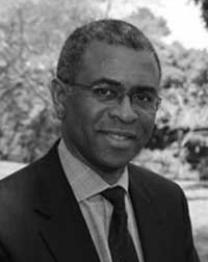
Mr. Harris brings over 25 years of international experience in the fields of international economics and development policy analysis, coupled with knowledge of the United Nations system, multilateral and inter–agency coordination processes. He has extensive experience in the design of macroeconomic policies and its application as a central instrument for the reduction of poverty and for resilient and sustained economic development.
His work in the field of economics also focuses on the macroeconomic linkages with global social and environmental policies.
Since 2015, Mr. Harris has served as Assistant Secretary-General and Head of the New York Office of the United Nations Environment Programme (UNEP). He joined UNEP’s Senior Management Team in 2013 as Director of the New York Office and Secretary to the Environment Management Group.
Prior to joining UNEP, Mr. Harris began his career in the International Monetary Fund (IMF) in 1988, where he worked in the African Department and the Fiscal Affairs Department. In 2002 he became an Adviser in the Policy Development and Review Department, and was appointed in 2008 as Special Representative to the United Nations, in addition to serving as Assistant Director of the Strategy and Policy Review Department.
Mr. Harris holds a Bachelor of Science degree in German and political science and an advanced degree in economics. He was awarded an Advanced Studies Certificate in international economics and policy research from the Institute of World Economics in Kiel, Germany.
Salma is the Chief Executive Officer of Cashew Coast, a business that integrates the cashew value chain from farm (West Africa) to fork (Europe).
Operating in Cote d’Ivoire, Cashew Coast has built an organic supply chain of more than 5000 smallholders, and employs 700 young women and men at its 9000T cashew processing plant. It is currently expanding its operations into a second processing facility.
Salma has spent the last 18 years working on debt, equity and special situations investments in London and Africa as an investment banker.
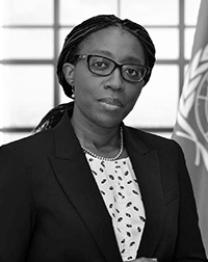
Vera Songwe is the Under-Secretary-General of the United Nations and Executive Secretary of the Economic Commission for Africa (ECA). Upon her appointment, she became the first woman to lead the institution in its 60-year history.
As Executive Secretary, Songwe’s reforms have focused on “ideas for a prosperous Africa”, and have brought to the fore critical issues of macroeconomic stability, development finance, private sector growth, poverty and inequality, the digital transformation, trade and competitiveness.
She was recently listed as one of Africa’s 50 most powerful women by Forbes and named as one of the ‘100 Most Influential Africans’ by Jeune Afrique in 2019. In 2017, New African Magazine listed her as one of the ‘100 Most Influential Africans’ and the FT named her one of the ’25 African to watch’ in 2015. Songwe is acknowledged for her long-standing track record of providing policy advice and her wealth of experience in delivering development results for Africa. She has written extensively on development and economic issues including on debt, infrastructure development, fiscal and governance issues. She is well published and contributes to the development debate across a broad spectrum of platforms including in the Financial Times.
Prior to ECA, she held a number of senior leadership roles with the International Finance Corporation and World Bank.



